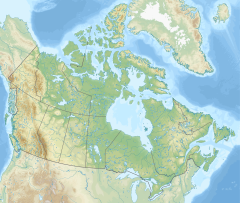The Thomsen River, located in the Northwest Territories of Canada, is the northernmost usable river of the country. It is famous for canoeing.[1]
| Thomsen River | |
|---|---|
 Thomsen River in July | |
| Location | |
| Country | Canada |
| Territory | Northwest Territories |
| Physical characteristics | |
| Mouth | |
• location | Castel Bay |
• coordinates | 73°59′41″N 119°43′27″W / 73.99481°N 119.7242°W |
Course
editIt flows across Banks Island in the Canadian Arctic Archipelago, and flows northward through Aulavik National Park before it empties through the Castel Bay into the M'Clure Strait (part of the Viscount Melville Sound of the Arctic Ocean).
Fishing
editThe Thomsen River on northern Banks Island has been described as the most northerly multi-species river in North America. At least three fish species, lake trout (Salvelinus namaycush), least cisco (Coregonus sardinella), and ninespine stickleback (Pungitius pungitius), reach their known northern limit of distribution in the Thomsen River while the Arctic char (Salvelinus alpinus) is a common species. Lake whitefish (Coregonus clupeaformis) may also occur in upper reaches of the Thomsen and marine fourhorn sculpin (Myoxocephalus quadricornis) are occasionally found in the lower reaches of the river.[2] Approximately one half of the Thomsen River watershed lies within Aulavik National Park.[3]
See also
editReferences
edit- ^ "Thomsen River". GeoNames.
- ^ "343363" (PDF). DFO MPO GC Canada.
- ^ Stephenson, S.A. "Fishes of the Thomsen River, Banks Island, Northwest Territories". Government of Canada. Retrieved July 22, 2021.
